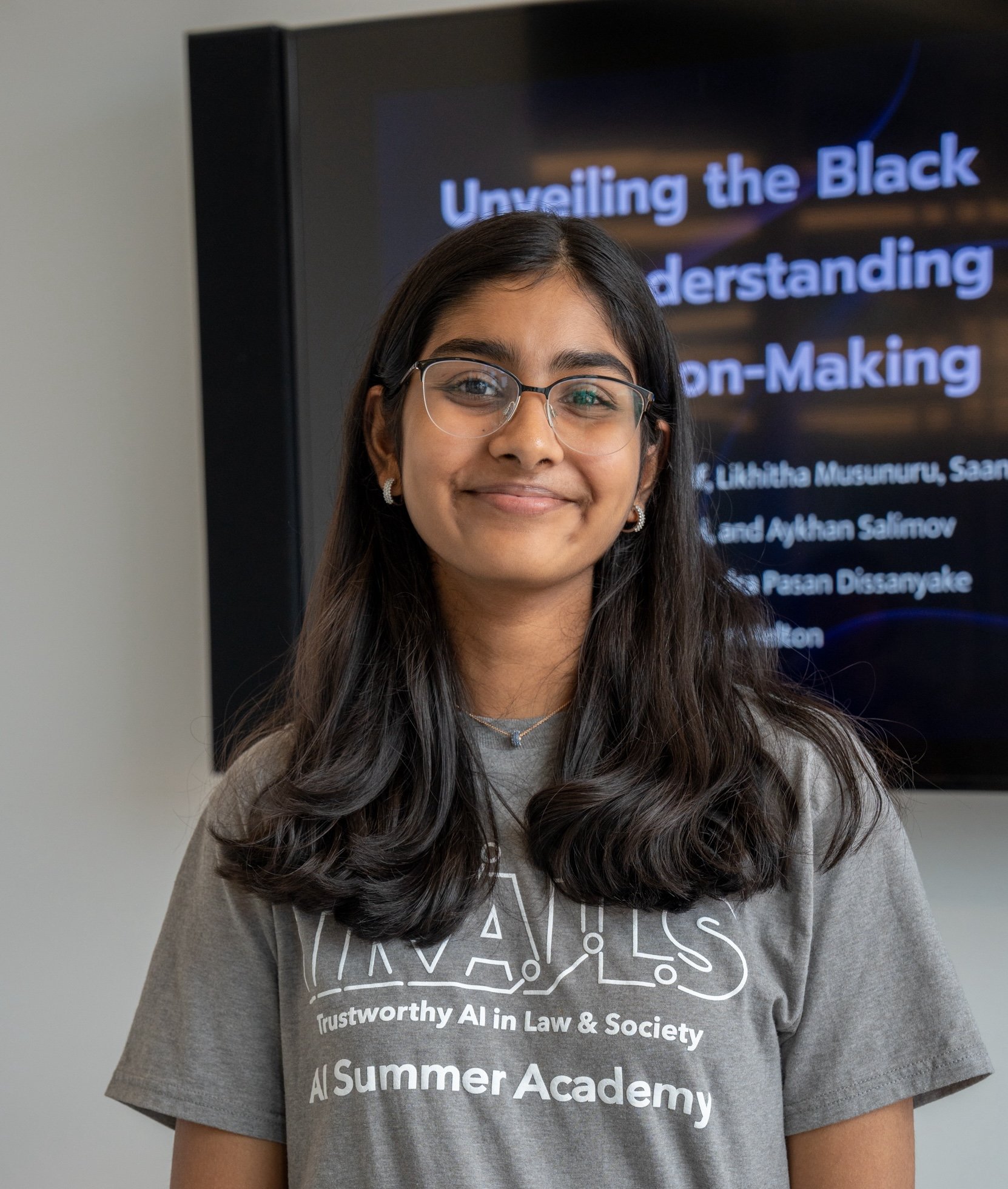
Kate Atchison
Associate Director, Iribe Initiative for Inclusion and Diversity in Computing, University of Maryland
Kate Atchison is the Associate Director of the Iribe Initiative for Inclusion and Diversity in Computing at the University of Maryland. She joined UMD in 2016 as part of the Maryland Center for Women in Computing, and has continued to support diversity, equity and inclusion efforts across the field.
Area of Expertise: Computing Education
-
Kramarczuk, K., Weintrop, D., Plane, J., Atchison, K., & Avery, C. (2023). CompSciConnect: A Multi-Year Summer Program to Broaden Participation in Computing. Proceedings of the 54th ACM Technical Symposium on Computer Science Education V. 1, 319–325.
Abstract: As society increasingly relies on computers to drive social, economic, and political decisions, the computing workforce must reflect the racial and gender diversity of the larger population. This experience report presents CompSciConnect (CSC), a multi-year program designed to broaden participation in computing for middle school aged students from historically excluded populations (girls and/or Black, Latina/o/e/x, and Native American [BLNA] students). Each cohort of CSC participants span three years with participants meeting for 2 weeks in the summer and one weekend a month during the school year. Students progress through three levels of the program: Yellow (beginner), Red (intermediate), and Terp (advanced). Quantitative and qualitative data guided the growth and implementation of CSC. CSC began in 2012 with just 14 students and now has reached over 532 students. Additionally, CSC alumni cite their experiences in CSC as contributing to their decisions to major in a computing field. Various design factors-such as community-centered student recruitment strategies, the long-term structure of the program, and the scaffolded curriculum-contributed to CSC's growth and its positive impact on CSC participants. In this paper, we present CSC, elaborate on the design factors that led to CSC's success, and highlight the challenges and lessons learned throughout CSC's development.
-
Kramarczuk, K., Narayanasamy, M., Atchison, K., & Plane, J. (2022). Training Near-Peer Mentors for Instructional Roles in Informal K-12 Computing Programs. Proceedings of the 53rd ACM Technical Symposium on Computer Science Education V. 2, 1125.
Abstract: The benefits of near-peer mentoring models in computing education contexts are well known, but research on near-peer mentor training best practices is limited. This research evaluates the impact of a 3-week instructor training on undergraduate CS majors' confidence and preparedness to teach and lead K-12 informal computing programs across a 12-week summer period. This poster presents features of the training that were beneficial to near-peer undergraduate instructors as they performed their summer teaching duties and factors that could be improved or further developed in the future.
-
Kramarczuk, K., Narayanasamy, M., Khan, A., Plane, J., & Atchison, K. (2022). Exploring the Relationship Between Undergraduate Near-Peer Intersectional Computing, Mentoring, and Instructor Identities. Proceedings of the 53rd ACM Technical Symposium on Computer Science Education V. 2, 1093.
Abstract: This paper reports on undergraduate computer science (CS) majors' experiences as near-peer instructional leaders in informal K-12 computing programs during a 12-week summer period. We analyze how the undergraduates' prior experiences in computing and their intersectional computing identities influence their self-perceptions as mentors and instructors. Case study analyses of the undergraduates revealed that their journeys in computing (e.g., their level of access to computing education courses or their exposure to influential role models) directly influenced their mentor and instructor identity development. This poster provides evidence for the need for more intersectional approaches to near-peer mentoring models.
-
Kramarczuk, K., Atchison, K., Plane, J., & Narayanasamy, M. (2021). The Power of Mentoring Programs in Retaining Women and Black, Indigenous, and Students of Color in Undergraduate Computing Majors. 2021 International Conference on Computational Science and Computational Intelligence (CSCI), 1125–1128.
Abstract: This paper outlines the effectiveness of an undergraduate mentoring program offered through the Department of Computer Science at the University of Maryland in retaining historically marginalized undergraduate students in science, technology, engineering, mathematics, and computer science (STEM-CS) majors. Each undergraduate teacher/mentor (called an Ambassador) is responsible for providing support for current university students or for K-12 computing outreach programs. Enrollment and survey data show that the Ambassador program is successful in retaining undergraduate computing majors in STEM-CS. Ambassadors indicated that they appreciated the community aspect of the Ambassador program and they felt empowered to solve diversity problems in STEM-CS.
-
Kramarczuk, K., Plane, J., & Atchison, K. (2021). First-Generation Undergraduate Women and Intersectional Obstacles to Pursuing Post-Baccalaureate Computing Degrees. 2021 Conference on Research in Equitable and Sustained Participation in Engineering, Computing, and Technology (RESPECT), 1–8.
Abstract: The number of first-generation women college students pursuing graduate-level research in computer science (CS) and engineering is chronically low compared to men. This study uses Rodriguez & Lehman's (2017) intersectional computing identity theory to analyze pre- and post-survey data collected during three years of a weekend-long all-women and non-binary computing research workshop. We explore the role that systemic factors play in the underrepresentation of first-generation women in graduate-level computing research and investigate how the weekend-long research experience impacted participants' computing identities in a research context. Wilcoxon rank sum tests revealed that first-generation women express lower comfort levels to complete research in the future compared to continuing generation women (p = 0.017). However, there was no significant difference between first-generation and continuing generation participants' interest to do research. Survey data also revealed that the majority of participants benefited from the workshop and found all-women and nonbinary teams more encouraging than traditional, male-dominated computing spaces. Findings indicate that first-generation women are more likely to have experiences in computing that lower their confidence to complete research compared to continuing generation women. However, they also reveal that research workshops have the potential to support students' intersectional computing identities and challenge systemic barriers that lower student interest and confidence in computing graduate programs. In order to close the gender gap in graduate-level computing programs, institutions of higher education should consider hosting research workshops that simultaneously provide research experiences for undergraduates (REU) and support the intersectional computing identities of students most underrepresented in the field.
-
Atchison, K., & Plane, J. (2019). Building a Community of Undergraduate Women: Ambassadors for Computing Outreach. Proceedings of the 50th ACM Technical Symposium on Computer Science Education, 1282.
Abstract: This talk describes the Maryland Center for Women in Computing (MCWIC) ambassador program that was designed to empower current undergraduate women to lead K-12 outreach efforts for MCWIC and build a community of undergraduate students interested in diversity, inclusion and education. For the last 7 years, the MCWIC ambassadors led summer camps, after school programs in schools, weekend workshops, and programs that support current undergraduate population. The program has grown to the point that we now employ over 15 undergraduate students each semester to support these activities. Come to this talk to learn more about how this program was created, how it is sustained, and how the ambassadors benefit from being a part of the program while also serving the greater community.





